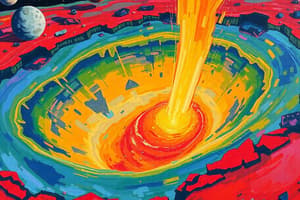Podcast
Questions and Answers
The meteorite was ______ in diameter and left a crater 500km across.
The meteorite was ______ in diameter and left a crater 500km across.
40-60km
The space rock was ______ times the size of the one that wiped out the dinosaurs.
The space rock was ______ times the size of the one that wiped out the dinosaurs.
200
Scientists hiked to the impact site in South Africa to chisel off chunks of ______ to understand the crash.
Scientists hiked to the impact site in South Africa to chisel off chunks of ______ to understand the crash.
rock
Prof Nadja Drabon is from ______ university.
Prof Nadja Drabon is from ______ university.
The impact site in Eastern Barberton Greenbelt is one of the oldest places on Earth with remnants of a ______ crash.
The impact site in Eastern Barberton Greenbelt is one of the oldest places on Earth with remnants of a ______ crash.
Life during the time of the impact was very simple, consisting mainly of ______ composed of single cells.
Life during the time of the impact was very simple, consisting mainly of ______ composed of single cells.
Prof Drabon often travels with ______ to protect against dangerous wildlife while researching.
Prof Drabon often travels with ______ to protect against dangerous wildlife while researching.
The team collected hundreds of kilograms of ______ and took them back to labs for analysis.
The team collected hundreds of kilograms of ______ and took them back to labs for analysis.
It gouged out a 500km ______ and pulverised rocks.
It gouged out a 500km ______ and pulverised rocks.
A huge ______ would have swept across the globe.
A huge ______ would have swept across the globe.
The tsunami would have ripped up the sea floor and flooded ______.
The tsunami would have ripped up the sea floor and flooded ______.
All that energy would have generated massive amounts of heat that boiled the ______.
All that energy would have generated massive amounts of heat that boiled the ______.
Without sunlight penetrating the darkness, simple life on land or in shallow water that relied on ______ would have been wiped out.
Without sunlight penetrating the darkness, simple life on land or in shallow water that relied on ______ would have been wiped out.
The rock evidence showed that the violent disturbances churned up nutrients like ______ and iron.
The rock evidence showed that the violent disturbances churned up nutrients like ______ and iron.
The findings suggest that the big impacts were like a giant ______, sending essential ingredients for life around the globe.
The findings suggest that the big impacts were like a giant ______, sending essential ingredients for life around the globe.
Study Notes
Meteorite S2 Impact
- A meteorite named S2 impacted Earth 3 billion years ago
- S2 was 40-60 km in diameter, 50-200 times the size of the meteorite which killed the dinosaurs
- S2 left a crater 500km across
- The impact caused a tsunami larger than any in recorded human history
- The impact boiled the oceans, causing up to tens of meters of water to evaporate
- Air temperatures increased by 100°C due to the impact
Impact Effects on Early Life
- The impact wiped out simple lifeforms on land and in shallow water
- The impact dispersed nutrients such as phosphorus and iron throughout the ocean
- The tsunami brought iron-rich water from deep ocean to the surface, providing energy for early microbes
- Early life bounced back and flourished after the impact, showing resilience
Research
- Scientists found spherule particles - tiny rock fragments - at the impact site in South Africa
- Evidence from the spherule particles indicates that the impact significantly affected early life
- Findings were published in the academic journal PNAS
Studying That Suits You
Use AI to generate personalized quizzes and flashcards to suit your learning preferences.
Description
Explore the catastrophic impact of the S2 meteorite on Earth, which occurred 3 billion years ago. Learn about the size of the meteorite, the gigantic tsunami it caused, and how early life on Earth adapted and flourished after the disaster. This quiz offers insights into the significant geological and biological changes initiated by this event.




